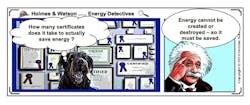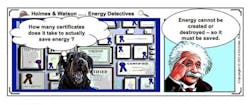Requiring Certifications to do Energy Audits & Benchmarking May Keep the Bureaucrats Happy but they Don’t Provide the Skills Required to Actually Save Energy
Watson: I recently wasted a perfectly good weekend (and $1,500) to become a “Certified Energy Dog” (CED). Now I have another Certificate for my wall, a few more initials after my name and am qualified to do Energy Audits and Benchmarking for government agencies and Utility Companies. I look pretty doggone good on paper but don’t really feel like I’m qualified to be an Energy Manager.
Holmes: That’s because you’re not qualified. But you’re conscientious, anxious to learn the skills you need, realize that training didn’t provide them and aren’t satisfied just following the flock and playing the “qualified-on-paper-only” game.
And you’re not alone. More than one experienced Energy Engineer has told me after completing some of those courses that many of those “Certifications” appear to exist primarily as a means for the sponsoring agency to promote themselves and make money. Issuing credentials to someone after a weekend overview of a few topics doesn’t make them a fully qualified and Certified Energy Professional.
Watson: I agree. Even though I’ve been through the training and have my CED, I realize there’s still a lot I don’t know. I need your help. I don’t want to waste any more time and money getting Certifications that only qualify me do Benchmarking and Energy Auditing, exercises that don’t save any energy and are of little value to anyone other than the agencies promoting them. How can I get the skills I need to Actually Save Energy?
Holmes: I remember experiencing feelings similar to yours after I left an engineering firm where I had been doing audits, studies and designs to start my own business operating buildings. I realized very quickly on my first job how little I knew about the Real World and the actual equipment that was using the energy.
I was a Certified Energy Manager (CEM) and a Registered Professional Engineer with Bachelor’s and Master’s degrees in mechanical engineering. I had been out of school 12 years and had started and run an Energy Conservation Department for an Engineering Consulting firm for five years. I knew the Theory but had very little experience with the actual energy systems. I felt just the same way you do, was determined to get skills I needed, and I did!
Watson: My engineering program focused almost entirely on theory. We had few labs and our field experience was limited to a couple of field trips. Some of my professors seemed to feel that there was little value in spending time in the field as we could set up computer models of energy systems.
I’m embarrassed to recommend changes that I really don’t thoroughly understand, that I couldn’t implement. I want to get as much paws-on experience as I can to connect the theory with the actual energy systems. What will it take for me to become a successful Energy Manager, Holmes?
Holmes: Unlike medicine and other fields that include internships, I think it’s really shortsighted of engineering schools not to require and provide something similar. Engineers must get their practical experience after they graduate. As you have astutely realized, a few certificates on your wall doesn’t make you a qualified Energy Professional; what you need is 2-4 years of practical experience in the field.
My advice to you and all young Energy Professionals is:
- Get out of the office and spend as much time as you can in the field.
- Spend time working in electrical and mechanical equipment rooms with the people who operate and maintain the energy systems, electricians, pipefitters, technicians
- Learn what chillers, air compressors, boilers, pumps and heat exchangers look like, sound like and smell like. Put your paws on them and feel them running. Read the gauges, change a setting and see what happens, how one system affects another. Walk around them, crawl under and over, climb up on catwalks.
- Get some battle scars; rip your fur on a protruding screw or bang your head on a threaded rod from a steel pipe hanger a few times. Get your collar caught while standing on a ladder leaning against a steel cooling tower pipe.
- Get up on rooftops with air handling units, exhaust fans and cooling towers.
- Watch boilers and chillers being re-tubed.
- Take some Temperature Control System Drawings home over the weekend and see if you have any inkling of how those systems actually work. On Monday morning open up the Panels and try to relate them to those drawings.
- Develop enough confidence to be unafraid to ask questions of the various people you encounter.
- Separate fact (physics, good science and engineering) from misinformation (myth, hype and sales pressure).
- Learn everything you can – both the right and the wrong ways from others; what to do and what not to do, and then do it! Take responsibility, don’t just theorize about what needs to be done, figure out how to do it.
- Take risks, make decisions, make mistakes and learn from your mistakes. The only way to avoid mistakes is to avoid doing anything. As one of my favorite chief engineers always used to say, “The reason I know so much is because I have screwed up so many times”. He’s right. I know because I’ve made a lot of mistakes too.
Until you have done those things, and not just once, but time and time again Watson you won’t be a Qualified Energy Manager no matter what all of those framed certificates on your wall say.
Watson: I am beginning to understand how much I have to learn before I will have the skills I need to be a successful Energy Professional.
Holmes: After working with you for quite a while Watson, I’m certain you’re going to find that you have what it takes to be a “Real Energy Manager” and find that actually making a positive contribution to this Planet makes you feel great. Good luck!
Tell us about your experiences, both good and bad with energy professionals, what has worked and what hasn't. Send us your comments, thoughts and suggestions on how to improve our profession so we can all continue to learn from each other. Thanks – Holmes & Watson.

